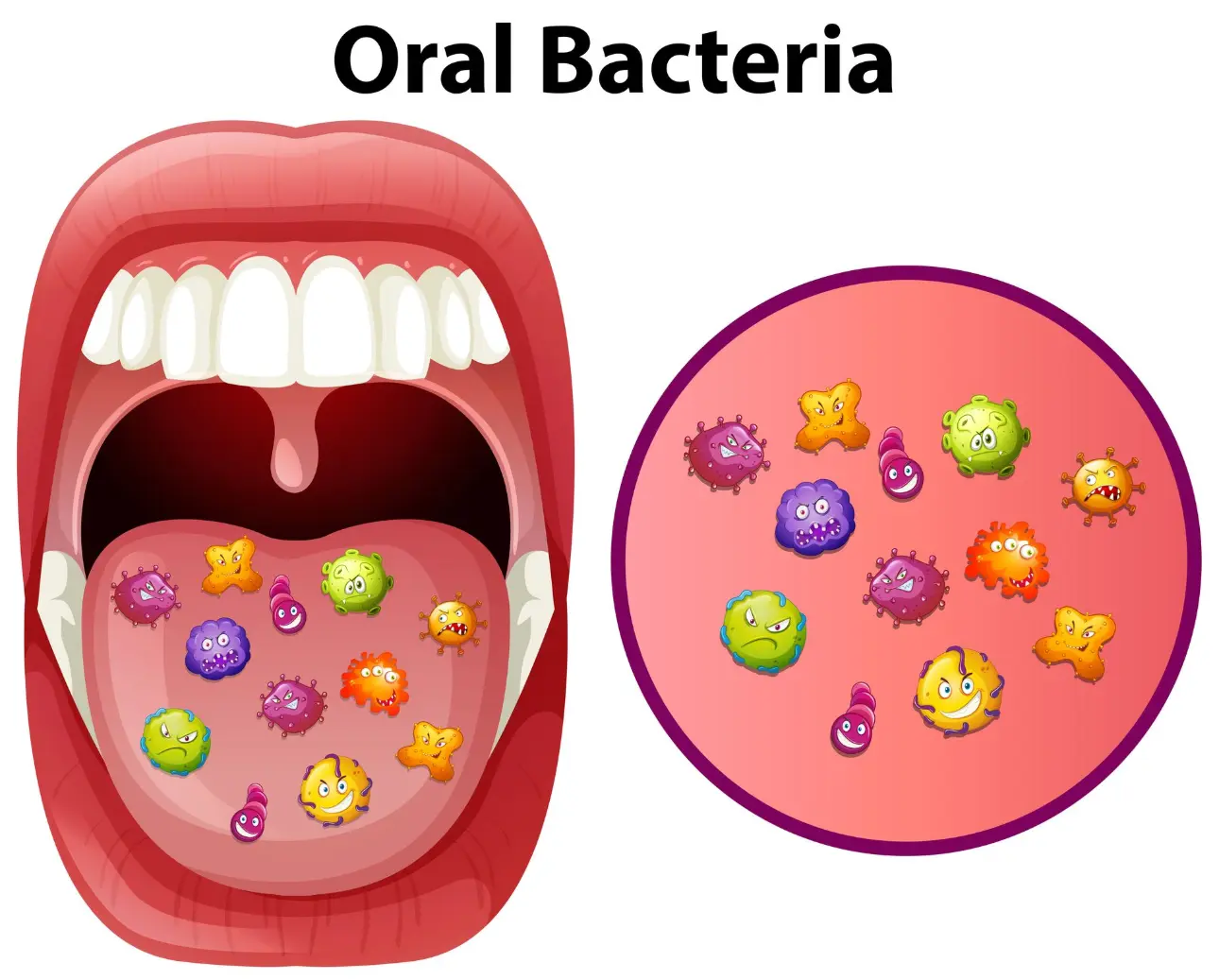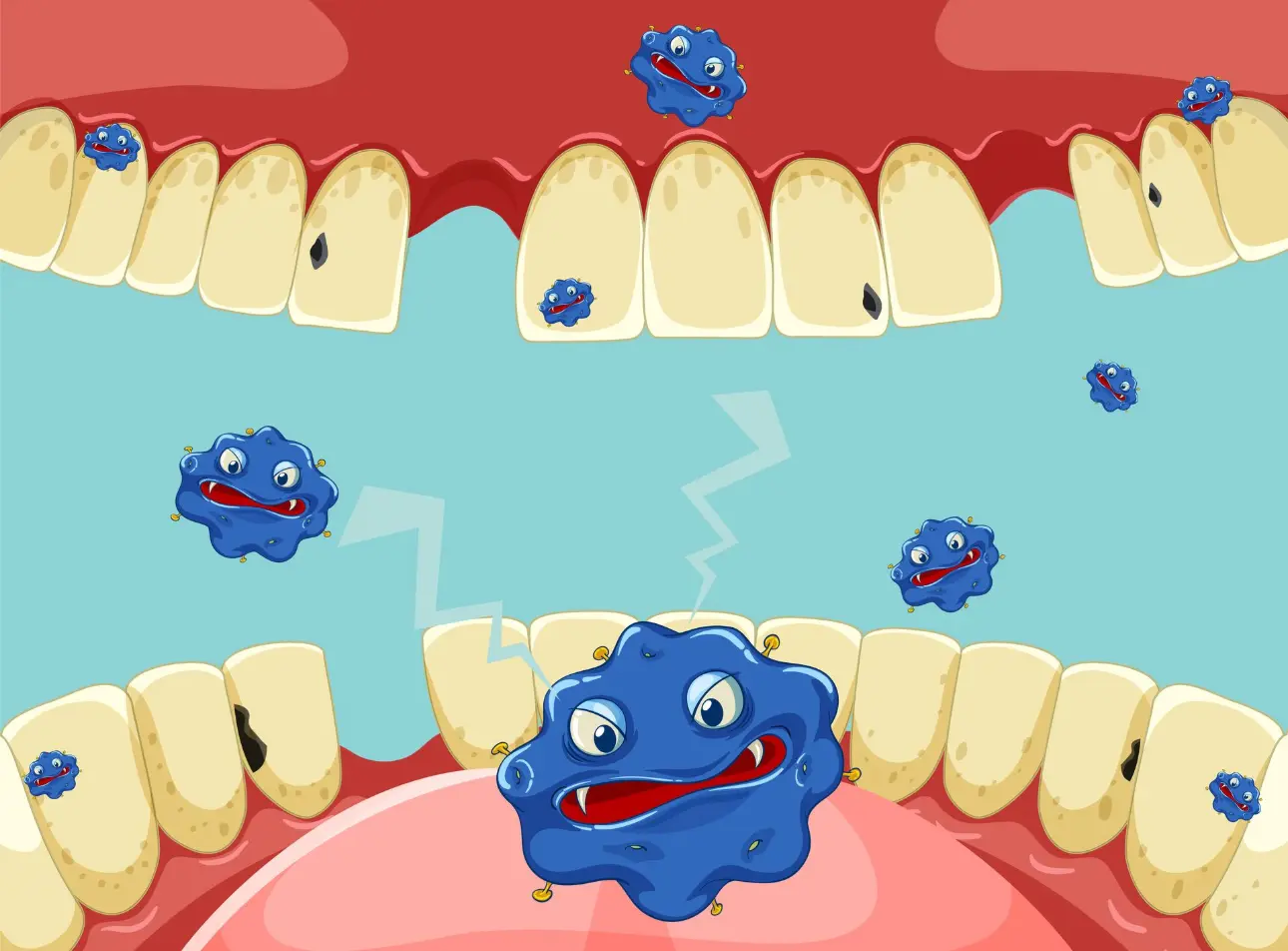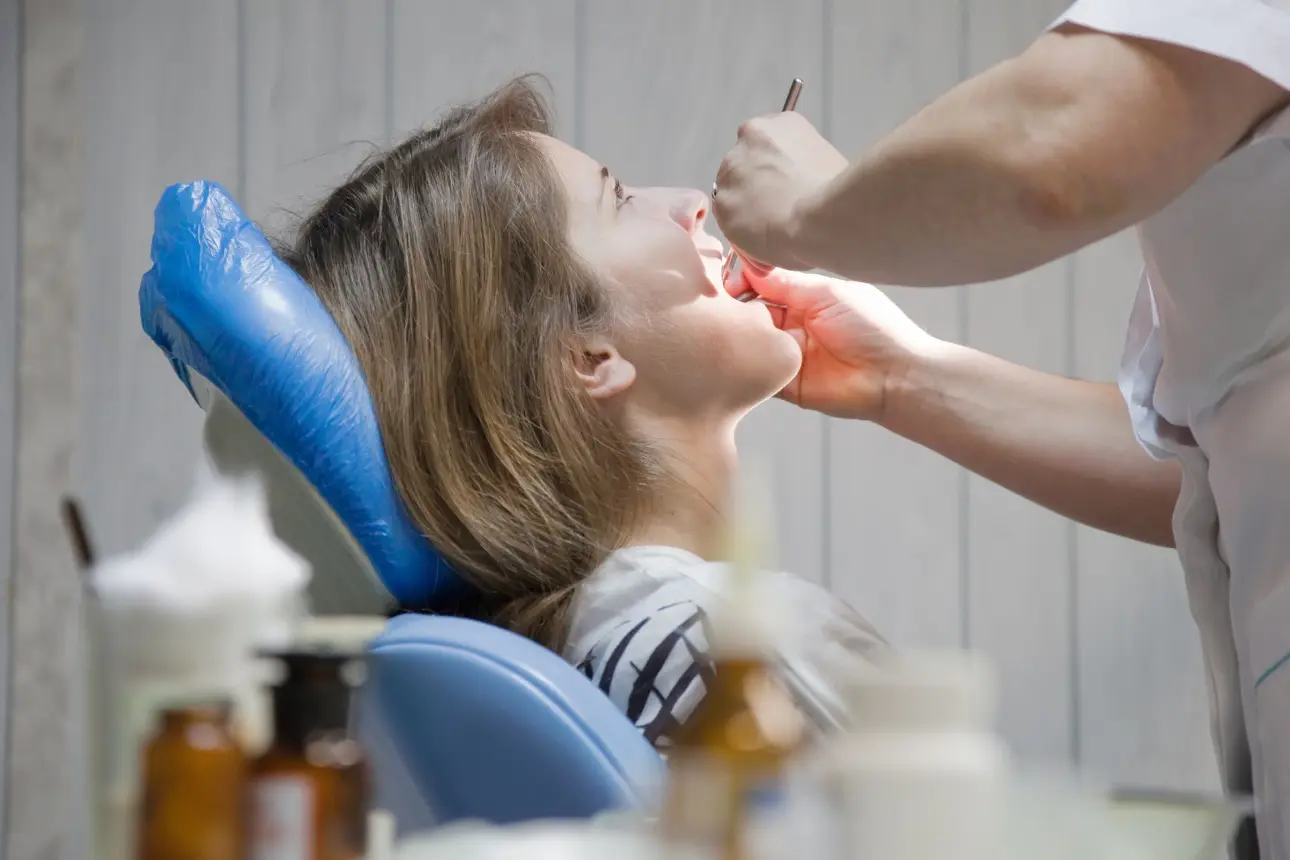Most people are surprised to learn that a healthy mouth contains billions of microorganisms. While traditional dental advice has focused on "fighting germs," modern science reveals a more nuanced truth: your oral cavity hosts a complex ecosystem where beneficial bacteria play crucial roles in protecting your teeth and gums. At Vident Dental Clinic, we embrace this evolved understanding of oral health that moves beyond simply eliminating bacteria to fostering a balanced microbiome.
This comprehensive guide explores the fascinating world of your oral microbiome and provides evidence-based strategies to cultivate a healthier bacterial balance for improved dental wellness.
Understanding Your Oral Microbiome: A Delicate Ecosystem
Your mouth represents one of the most diverse microbial habitats in your entire body, second only to your gut in bacterial complexity.
The Composition of a Healthy Oral Microbiome
A balanced oral microbiome typically includes:
- Diverse bacterial species: Over 700 different types of bacteria may inhabit a healthy mouth
- Protective fungi: Certain yeasts play regulatory roles in the oral ecosystem
- Bacteriophages: Specialized viruses that infect bacteria and help maintain balance
- Archaea: Ancient single-celled organisms that contribute to microbial diversity
- Protozoa: Microscopic organisms that help regulate bacterial populations
This diversity isn't just incidental—it's essential for oral health. Research published in the Journal of Dental Research demonstrates that individuals with greater microbial diversity typically experience lower rates of cavities and gum disease compared to those with less diverse oral ecosystems.
The Protective Functions of Beneficial Bacteria
Contrary to the oversimplified "all bacteria are harmful" narrative, many oral microbes provide significant benefits:
- Colonization resistance: Beneficial bacteria occupy space that might otherwise harbor pathogens
- pH regulation: Certain species help neutralize acids that damage enamel
- Nitric oxide production: Some oral bacteria convert dietary nitrates into nitric oxide, supporting cardiovascular health
- Immune system education: Exposure to diverse microbes helps train proper immune responses
- Anti-inflammatory compounds: Several beneficial species produce substances that reduce gingival inflammation
These protective functions explain why approaches focused solely on eliminating bacteria often fail to produce lasting oral health improvements.
The Disruption of Modern Life: Threats to Microbial Balance
Several aspects of contemporary lifestyles and practices can disturb the delicate balance of the oral microbiome.
Antimicrobial Overuse
While antiseptic mouthwashes and antibiotics serve important purposes in specific situations, their routine use can create unintended consequences:
- Indiscriminate elimination: Most antimicrobial products kill beneficial bacteria alongside harmful ones
- Resistant strain selection: Surviving bacteria may develop antimicrobial resistance
- Microbial vacuum: Eliminating resident bacteria creates open niches that opportunistic pathogens can exploit
- Disrupted communication: Many oral health benefits depend on bacterial interactions that antimicrobials interrupt
- Reduced diversity: Repeated use of strong antimicrobials decreases overall microbial diversity
A study in Scientific Reports found that twice-daily use of a strong antiseptic mouthwash for just one week reduced oral nitrite production by over 90%, leading to measurable increases in blood pressure—highlighting the systemic impacts of disrupting oral bacteria.
Dietary Influences on Microbial Communities
What you eat significantly shapes which bacterial species thrive in your mouth:
- Sugar consumption: Frequent sugar exposure selectively promotes acid-producing bacteria
- Refined carbohydrates: Highly processed starches rapidly convert to simple sugars that feed harmful bacteria
- Lack of fiber: Dietary fiber supports the growth of beneficial bacterial species
- Limited variety: Monotonous diets reduce microbial diversity
- Artificial sweeteners: Some evidence suggests these may alter microbial metabolism
The relationship between diet and oral microbiome composition helps explain why traditional societies with minimal processed food consumption often show remarkably low rates of dental disease despite limited access to modern oral hygiene products.
Lifestyle Factors Affecting Oral Bacteria
Beyond diet, several other factors influence your oral microbiome:
- Smoking: Dramatically alters bacterial communities, favoring pathogenic species
- Stress: Psychological pressure changes salivary composition and immune function
- Sleep quality: Poor sleep affects inflammatory responses and bacterial regulation
- Hydration status: Reduced salivary flow alters the oral environment
- Medication use: Many common drugs have side effects that impact oral bacteria
These factors create individualized microbial profiles, explaining why one-size-fits-all approaches to oral health often produce inconsistent results.
Cultivating Balance: Strategies for Microbiome Health
Rather than declaring war on all bacteria, modern oral health approaches focus on creating environments where beneficial species can flourish.
Targeted Hygiene Approaches
Effective oral hygiene can remove harmful bacterial accumulations while preserving microbial diversity:
- Mechanical cleaning focus: Prioritize thorough brushing and interdental cleaning over antimicrobial products
- Selective antimicrobial use: Reserve stronger agents for specific therapeutic needs rather than daily use
- Appropriate timing: Consider using antimicrobial products at different times than probiotics
- Gentle cleansing techniques: Avoid unnecessarily aggressive brushing that damages protective oral tissues
- pH-balanced products: Choose oral care items that maintain healthy salivary pH
These approaches remove problematic bacterial biofilms without decimating the entire oral ecosystem.
Dietary Support for Beneficial Bacteria
Nutritional choices can actively support healthier bacterial communities:
- Prebiotic foods: Fibrous fruits and vegetables provide compounds that nourish beneficial bacteria
- Polyphenol-rich choices: Green tea, berries, and cocoa contain compounds that selectively inhibit pathogenic bacteria
- Vitamin K2 sources: Fermented foods provide this nutrient that helps beneficial bacteria thrive
- Nitrate-containing vegetables: Leafy greens support nitric oxide-producing bacteria
- Limited fermentable carbohydrates: Reducing frequency of refined sugar and starch exposure
A study in Applied and Environmental Microbiology found that regular consumption of nitrate-rich vegetables like spinach and arugula significantly increased the proportion of nitrate-reducing beneficial bacteria in the oral cavity within just two weeks.
Probiotic Approaches for Oral Health
Introducing beneficial bacterial strains shows promising results for oral health:
- Targeted oral probiotics: Strains like Streptococcus salivarius K12 and M18 specifically support oral health
- Multiple strain formulations: Combinations of beneficial bacteria often outperform single-strain products
- Delivery method considerations: Lozenges and chewable tablets provide better oral colonization than swallowed capsules
- Timing optimization: Using probiotics after cleaning but before sleep maximizes effectiveness
- Consistency importance: Regular use produces better results than occasional supplementation
Clinical research in the Journal of Clinical Periodontology demonstrated that specific oral probiotic strains reduced gingivitis markers by up to 42% compared to placebo when used consistently for 8 weeks.
Lifestyle Modifications for Microbial Health
Several broader lifestyle changes support a healthier oral microbiome:
- Stress management: Practices like meditation reduce cortisol levels that affect bacterial balance
- Adequate hydration: Proper fluid intake supports optimal salivary flow and composition
- Quality sleep: Sufficient rest supports immune regulation of oral bacteria
- Smoking cessation: Eliminating tobacco allows restoration of healthier bacterial communities
- Limited alcohol consumption: Reducing alcohol helps maintain proper oral pH and bacterial balance
These modifications create environments where beneficial bacteria naturally thrive without excessive intervention.
Special Considerations Across Life Stages
Microbiome needs evolve throughout life, requiring age-appropriate approaches.
Early Life and Microbial Development
The foundation of oral microbial health begins in childhood:
- Vertical transmission: Many oral bacteria transfer from caregivers to infants
- Establishment window: The first three years represent a critical period for microbiome development
- Diversity importance: Exposure to varied environments supports healthier bacterial colonization
- Antibiotic impact: Early frequent antibiotic use may have lasting effects on microbial communities
- Diet introduction: Initial food exposures influence which bacterial species establish dominance
Research in Pediatrics shows that children born via C-section who miss exposure to maternal vaginal bacteria show different oral microbial patterns and higher rates of certain dental issues later in childhood.
Adolescence and Hormonal Influences
Teenage years bring unique microbial challenges:
- Hormonal effects: Puberty-related hormones change the oral environment
- Dietary independence: New eating patterns affect bacterial communities
- Orthodontic considerations: Braces and aligners create new niches for bacterial growth
- Compliance challenges: Inconsistent hygiene during this period impacts microbial stability
- Social influences: Peer pressure regarding diet and habits affects oral bacteria
Specialized approaches during this transitional period help maintain microbial balance despite these challenges.
Adult Maintenance and Restoration
Mature adults focus on preserving or restoring healthy bacterial communities:
- Cumulative impact management: Addressing the effects of long-term habits on microbial health
- Restoration considerations: Dental work creates new surfaces that affect bacterial adhesion
- Medication awareness: Managing the effects of common medications on oral bacteria
- Stress-microbiome connection: Recognizing how career and life stresses affect oral health
- Targeted interventions: More specific approaches based on established patterns
Personalized strategies based on individual history and current status yield the best results during this extended life phase.
Senior Oral Microbiome Health
Older adults face distinct microbiome challenges:
- Medication effects: Polypharmacy frequently leads to dry mouth and microbial shifts
- Reduced salivary flow: Age-related changes in saliva affect bacterial populations
- Systemic health connections: Managing the bidirectional relationship between oral bacteria and conditions like diabetes
- Prosthetic considerations: Dentures and implants create unique microbial environments
- Nutritional challenges: Dietary limitations may reduce intake of microbiome-supporting foods
Modified approaches accounting for these factors help maintain oral health and comfort during senior years.
The Future of Oral Microbiome Science
Research continues to advance our understanding of how to better support oral microbial health.
Emerging Research Directions
Several promising areas may soon transform clinical practice:
- Personalized microbial profiling: Identifying individual bacterial patterns to guide specific interventions
- Designer probiotics: Engineered beneficial strains that target specific oral health issues
- Prebiotics development: Compounds specifically designed to nourish beneficial oral bacteria
- Bacteriophage therapy: Using viruses that selectively target harmful bacteria while sparing beneficial ones
- Microbiome transplantation: Transferring beneficial bacterial communities from healthy donors
These approaches may eventually offer more sophisticated tools for managing the oral microbiome.
Integration with Systemic Health
The connection between oral bacteria and overall health continues to strengthen:
- Cardiovascular links: Oral bacteria influence nitric oxide production and vascular health
- Cognitive connections: Emerging research on oral microbiome relationships with neurological health
- Respiratory implications: Oral bacterial aspirations affect pulmonary conditions
- Metabolic interactions: Connections between oral bacteria and insulin sensitivity
- Inflammatory regulation: How oral microbes influence systemic inflammation
These connections highlight why oral microbiome health represents more than just a dental concern.
The Vident Approach to Microbiome-Centered Care
At Vident Dental Clinic, we've developed a comprehensive approach to supporting your oral microbiome health.
Our Assessment Process
We begin with thorough evaluation:
- Detailed history of antibiotic use and antimicrobial product exposure
- Assessment of dietary patterns affecting bacterial balance
- Evaluation of current oral hygiene practices and their microbial impact
- Identification of lifestyle factors influencing oral bacteria
- Examination for signs of microbial imbalance like localized decay or inflammation
This comprehensive assessment allows us to develop truly personalized recommendations.
Our Treatment Philosophy
Our approach emphasizes:
- Selective antimicrobial use only when clinically necessary
- Preservation of beneficial bacterial communities whenever possible
- Restoration materials and techniques that support microbial health
- Educational emphasis on bacterial balance rather than elimination
- Integration of emerging research into clinical recommendations
This philosophy recognizes that your mouth's bacterial communities are allies to be nurtured rather than enemies to be eliminated.
Our Preventive Recommendations
We provide guidance on:
- Appropriate product selection based on your specific needs
- Dietary adjustments to support beneficial bacteria
- Probiotic recommendations when indicated
- Lifestyle modifications that promote microbial balance
- Regular professional care timed to support microbiome health
These personalized recommendations help you maintain optimal bacterial balance between professional visits.
Conclusion: Partners in Microbial Health
The paradigm shift from "fighting germs" to "fostering balance" represents one of the most significant advances in our understanding of oral health. By working with your body's natural bacterial communities rather than against them, we can achieve more sustainable improvements in both dental and overall wellness.
At Vident Dental Clinic, we're committed to incorporating this evidence-based, microbiome-centered approach into all aspects of our care. We invite you to discuss how these principles might apply to your specific situation during your next appointment.
Remember that the trillions of microorganisms in your mouth aren't invaders to be eliminated—they're essential components of your body's ecosystem that, when properly balanced, contribute significantly to your health and wellbeing.
This article provides educational information about the oral microbiome. For personalized recommendations, please schedule a consultation with our dental team at Vident Dental Clinic.


